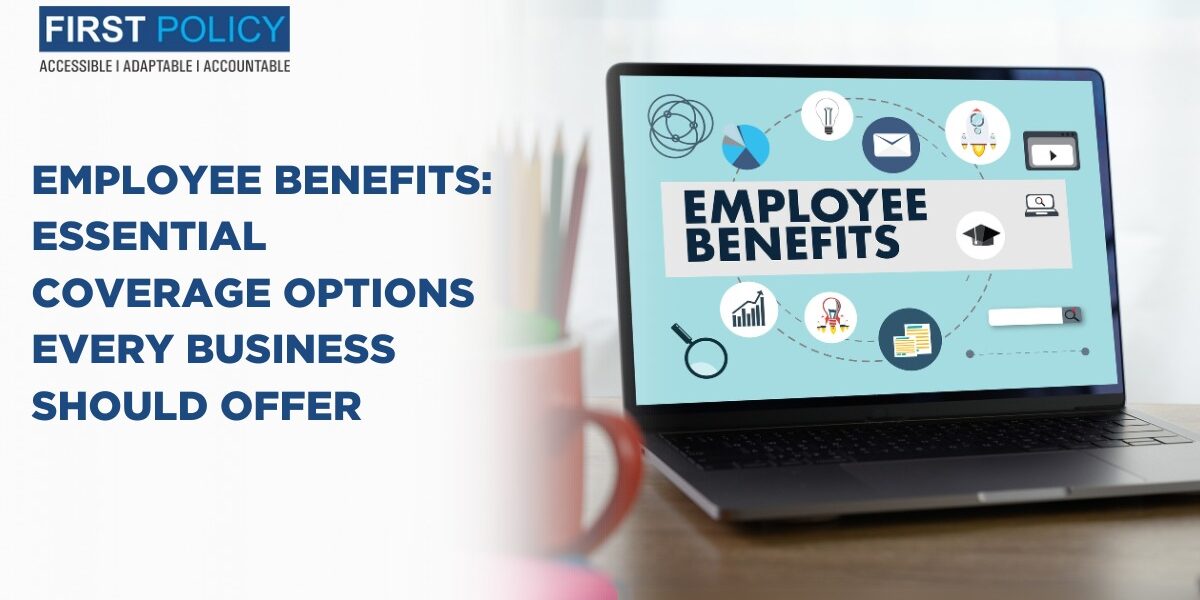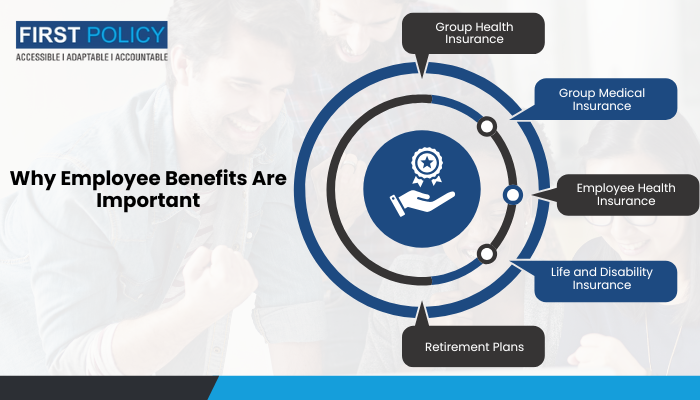
Employee Benefits: Essential Coverage Options Every Business Should Offer
No matter what industry you’re in today, attracting and retaining top talent is a challenge for all of companies. One of the surest ways to succeed at this is by providing a complete employee benefits package. Besides improving job satisfaction, employee health insurance and other benefits also increase productivity and reduce turnover and improve health among the workforce. Investing in a solid benefits plan is vital for businesses, specially those small and medium enterprises, that want to exceed in the market. In this blog however, we are going to discuss the most important covers an organization should offer to its employees ranging from group medical insurance, group health insurance and employee health insurance.
Why Employee Benefits Are Important

Employee benefits are not just basic salary. It increases a sense of well being, security and motivation for employees. They provide insurance to employees health insurance that keeps the employee safe in the event of their ill health.
A business that offers its employees a comprehensive benefits package sends a powerful message about its commitment to the well being of its employees. This in turn helps creates loyalty and has a tendency to cut down on high turnover, which is both time consuming and expensive for businesses. Additionally, some benefits, including group medical insurance, can be productive aids in preserving the employees’ financial security against unexpected medical expenditure.
1. Group Health Insurance
Group health insurance is one of the most important parts of an employee benefits package. Similarly, health coverage in the employment package is one of the important factor for any individual related to health and that pertains to such company which is willing to invest in their workforce.
The term group health insurance refers to medical coverage available to employees and, frequently, to the employees’ families. Because the costs are shared among the whole group, it tends to be less expensive than a group of individuals. In fact, insurance providers can also create better rates with businesses since the policies are collective in nature. The fact that medical expenses can be so costly without coverage makes this benefit especially beneficial to lure new talent and keep current workers, as medical expenses tend to run high.
Bringing group health insurance guarantees employees receive preventive care and lessen chances of sickness related absenteeism. Regular health check is a large part of the plan, and can catch potential health issues early on which reduces the chance of being subject to a long time illness.
Key Features of Group Health Insurance:
Comprehensive coverage: It typically includes doctor visits, hospital stays; emergency and often specialist consultations.
Affordable premiums: Individual health plans can be more expensive because they cover an individual.
Employee satisfaction: A good group health insurance plan supports employee morale and encourages employee satisfaction.
2. Group Medical Insurance
Another important benefit to consider offering to every business is group medical insurance. This coverage is similar to group health insurance in that it may include additional medical benefits, such as maternity care, prescription medications and outpatient services without the requirement of a group.
Group medical insurance is important because it offers more extensive healthcare service coverage. This coverage is very useful where employees are more likely to get injured or become ill on the job, such as in manufacturing or construction. It permits employees to receive the care they need without the expense of high out-of-pocket costs.
Prevention matters too, and businesses can provide group medical insurance as a way to promote that. Knowing insurance covers doctor check up makes employees more likely to go to see the doctor for regular check ups. In a proactive approach to health, the long term healthcare costs are predicted to be reduced for both the employee and the employer.
Benefits of Group Medical Insurance:
Extended medical services: Group medical insurance may include dental and vision as well as mental health services, in addition to basic healthcare.
Prescription coverage: Prescription medications can be an expensive item on an employee’s budget, but many plans cover the cost.
Attracts top talent: Having group medical insurance makes it a more attractive employer to prospective employees, in particular, those who stress the need for comprehensive healthcare benefits.
3. Employee Health Insurance
Employee health insurance is literally the umbrella term used for several types of healthcare coverage: group health insurance and group medical insurance. The reason why businesses provide employee health insurance is in a bid to make sure their employees are healthy, engaged, and motivated.
Employee health insurance not only benefits employees but it carries huge advantages for employers as well. One example is the tax benefits available to companies that offer health insurance to their employees, at least partially offsetting some of the costs of providing this, as they would to all workers.
Moreover, since businesses will be giving employee health insurance, then this will help reduce the financial stress of a paycheck paid to an employee who has taken sick, in other words a large portion of his pay gone towards medical expenses. As a result, employees are less likely to be distracted by financial worries and are more likely to work diligently at their jobs, which could results in increased productivity.
Key Benefits of Employee Health Insurance:
Tax advantages: Sometimes, the cost of providing employee health insurance is a deductible business expense.
Reduced absenteeism: Employees with access to healthcare are less likely to take time off due to illness and that productivity goes up.
Employee retention: Integrating employee health insurance can drastically lower your turnover rate, as employees tend to leave companies that don’t offer reasonable benefits.
4. Life and Disability Insurance
Life and disability insurance are one of the cornerstones of a comprehensive employee benefits package consisting of group health insurance and group medical insurance. Other types of insurance that support employees include life insurance, which pays an employee’s family if they die, and disability insurance, which replaces lost income if an employee can’t work because of illness or injury.
Access to these benefits gives employees peace of mind that if something bad were to happen — to their family, to themselves — they’ll have income in their pocket.
Types of Disability Insurance:
Short-term disability: Temporary illness or injury: it covers part of the employee’s salary (up to six months) during if he were temporarily ill or injured.
Long-term disability: If an employee is permanently disabled and unable to return to work the policy provides coverage for longer periods, up to retirement age.
5. Retirement Plans
It is also another critical thing that a business should offer, yet another such as 401(k) or it can be a pension to the employees. These plans assist employees to save for their future in their retirement life.
Businesses provide a retirement plan not only to help employees plan for the future but also to instill a sense of long haul commitment to the company. An employer willing to help employees secure their financial future will help keep employees with that employer.
Conclusion
Today, in the competitive job market it’s important to have a complete benefits package to attract and retain the best talent. If you are administering employee benefits plan group health insurance, group medical insurance, or employee health insurance, it is an important component. These coverages provide appropriate healthcare access to employees, and hence increase overall well being, job satisfaction and productivity.
While healthcare coverage is a must for a business, they would also do well to offer life and disability insurance and retirement plans so as to offer employees an all inclusive package that takes care of both their day and long term needs. Investing in employee benefits not only makes life better for employees but also can give a business a leg up on its own success by creating a loyal, motivated workforce.
Besides being a perk, integrating group health insurance, group medical insurance and employee health insurance in your employee offering is a crucial part of your business growth and sustainability.



